Toggle Background Color
OP
What is Football Manager 2019?
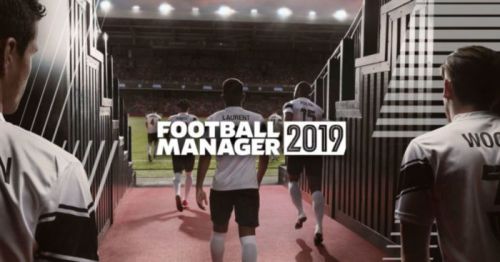
Football Manager is, as its name implies, a simulation game in which a player takes charge of a club team, an international team, or perhaps both at once. It is famous for its level of detail, its realism, and its sheer quantity of data, having such an excellent database that it is sometimes employed by real clubs for scouting purposes. Another thing the series is famous for is its nature as a time sink. Players will spend much of their free time thinking up new tactics, trying to refine their old ones, mulling over possible transfers and other assorted things the job requires one to think about.
It is a very popular series, being played by several professionals in the sport itself, with current Manchester United manager Ole Gunnar Solskjaer, Barcelona and France forward Ousmane Dembele, and Wolverhampton Wanderers and Portugal striker Diogo Jota among the highest profile. The series isn’t something new to Something Awful either, with a joint playthrough of 07 , loco88’s playthrough of 08 , an archived run through of 14 and a recent let’s play of 18, by habeasdorkus, behind those links.
Since then, FM19 and FM20 have been released, each of these games quite similar to the other but rather different to those that came before. A number of changes arrived when FM19 did, with a total overhaul of training, mentoring, the introduction of the much-maligned Video Assistant Referee (VAR), and, of course, Brexit. Team talks may now have cascading effects, so saying something a team leader likes may cause players who look up to him to have a similar positive reaction. Managing your players mentally is as important as managing their physical status.
There are a great deal of raw numbers to sift through, but the game does offer manager inductions, the closest equivalent to a tutorial in this sort of game. Even then, it can be overwhelming. I’ll do my best to simplify where I can. Should you not know a thing about football, I’m happy to talk at length about it, so the walls of text I might cough up will probably have some useful information in them somewhere.
Test Post
EX GENESIS:
(30/6/2018)

Though football in Exmouth doesn’t receive the same sort of exposure its resort facilities and palaeontological finds are showered in, it does still have a tendency to cause a stir when something of note occurs. To call the fallout from the latest session of managerial musical chairs a ‘stir’ would be understating the sheer perplexion coming out of Exmouth Harriers Football Club.
Beloved Excavators boss Clark Zybourne, 51, announced this morning that his contract had been terminated with immediate effect, leaving the Exmouth supporters confused and disheartened. Having taken the Sunshine Stadium club from the lowest rung of English football to within touching distance of the Football League, Zybourne was seen as the club’s ticket to greatness.
As it stands, Exmouth Harriers are a club with a steady upward trajectory. Formed in 2008, the Excavators have been climbing the non-league structure for a decade now. For a number of years, they have contested healthy rivalries with other south coast clubs, most notably Weymouth Wanderers, with whom they contest the Jurassic Classic.
Such pleasantries will need to be set aside while the two south-west sports club duel in the National League South. Weymouth fight to have a chance to break into the National League. Exmouth, without the rallying figure at the helm, seem set to struggle to merely survive.

Club Chairman Riyad Hakimi (pictured above) is believed to be close to announcing a replacement. Without a frontrunner for the job emerging, whoever the choice for new head coach ends up being will be a surprise for us all.
_______________
(1/7/2018, somewhere in Exmouth)
 : Am I right in saying this is your first foray into senior management, Mr. Berardi?
: Am I right in saying this is your first foray into senior management, Mr. Berardi?
 : That’s right. And just Gio is fine.
: That’s right. And just Gio is fine.
 : Let’s not get too familiar. We may be a semi-pro outfit, but I expect a level of professionalism here. If we are to make it to the big time, I believe that it’s important to instil these sorts of standards within the club. Now, before we start, do you have any questions?
: Let’s not get too familiar. We may be a semi-pro outfit, but I expect a level of professionalism here. If we are to make it to the big time, I believe that it’s important to instil these sorts of standards within the club. Now, before we start, do you have any questions?
 : None just yet.
: None just yet.
 : Good. Let’s continue. I’ll introduce you to the club. After Exmouth Town F.C. folded in 2008, many people in this town were understandably disappointed. To fill the void in their hearts, a group of four American expatriates founded this club, introducing it to the English footballing pyramid in the summer of 2008. The original crop of players comprised a group of construction workers, these men lending the club the nickname it keeps to this day. The Excavators, as we are called, are a club with big dreams. We intend to become a professional club within the next five years. The funds do so will not fall into our laps. Getting us to the next level is a job we’ve seen fit to entrust to you.
: Good. Let’s continue. I’ll introduce you to the club. After Exmouth Town F.C. folded in 2008, many people in this town were understandably disappointed. To fill the void in their hearts, a group of four American expatriates founded this club, introducing it to the English footballing pyramid in the summer of 2008. The original crop of players comprised a group of construction workers, these men lending the club the nickname it keeps to this day. The Excavators, as we are called, are a club with big dreams. We intend to become a professional club within the next five years. The funds do so will not fall into our laps. Getting us to the next level is a job we’ve seen fit to entrust to you.
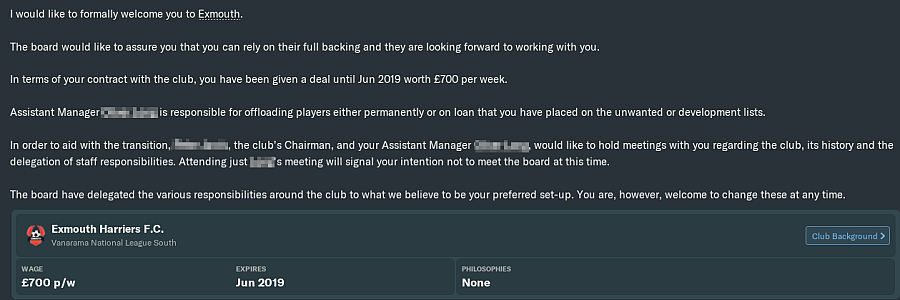
 : You have a year to impress us. You’re free to make a case to make your stay longer. Don’t force us to make it shorter. As I'm sure you're doubtless aware, we'll be playing our games in the National League South, one half of the sixth division of English football. This is as fine a place as any to start a managerial career. If you have realistic expectations about both the budget and the quality of football, you'll enjoy your time here. For now, let's get you acquainted with the facilities…
: You have a year to impress us. You’re free to make a case to make your stay longer. Don’t force us to make it shorter. As I'm sure you're doubtless aware, we'll be playing our games in the National League South, one half of the sixth division of English football. This is as fine a place as any to start a managerial career. If you have realistic expectations about both the budget and the quality of football, you'll enjoy your time here. For now, let's get you acquainted with the facilities…
_______________
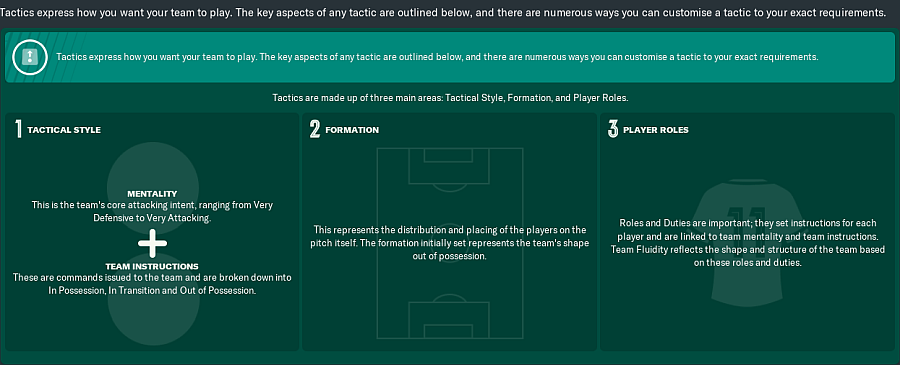
For the first time in the series, Football Manager 2019 sees the introduction of a tutorial, a series of manager inductions to get the player up to speed on the various aspects of the job. You’re free to set yourself as ‘experienced’ in-game to skip past these but they’re very useful for a new player. As stated in the OP, FM19 has seen a complete overhaul of the tactics and training mechanics, so let’s take a look at those first.
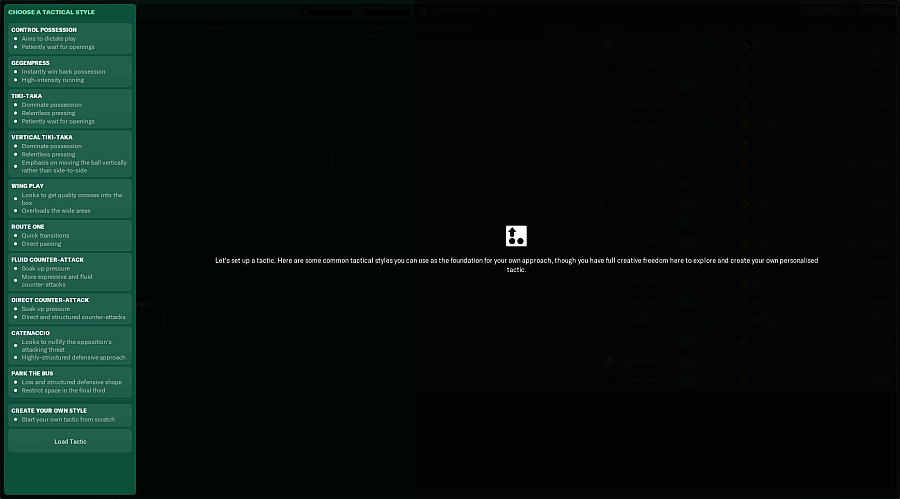
Gone are the days in which a manager selects a mentality like ‘control’, ‘counter’ or ‘contain’. From FM19 onwards, one selects a general mentality from very defensive to very attacking, and one is free to pick a pre-made mentality ordered from most aggressive to least aggressive. Under each of these headings, the game suggests three formations that it thinks would fit that tactic best. You’re free to change these afterwards to something that you might feel would do the job better, but these base formations are good foundations upon which to build.
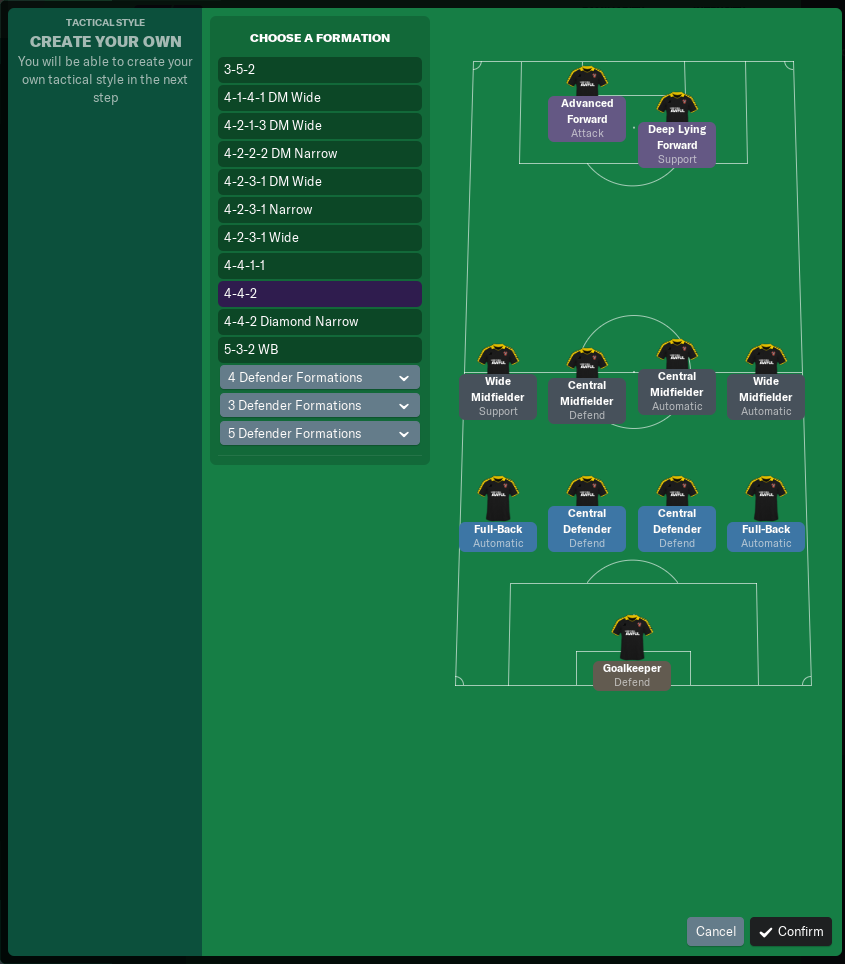
Each position has a variety of roles, with each player fitting a role based on their attributes. Getting the right combination of roles can make or break the balance of the team. While something might look good on paper, it could easily be torn apart by a single through ball.
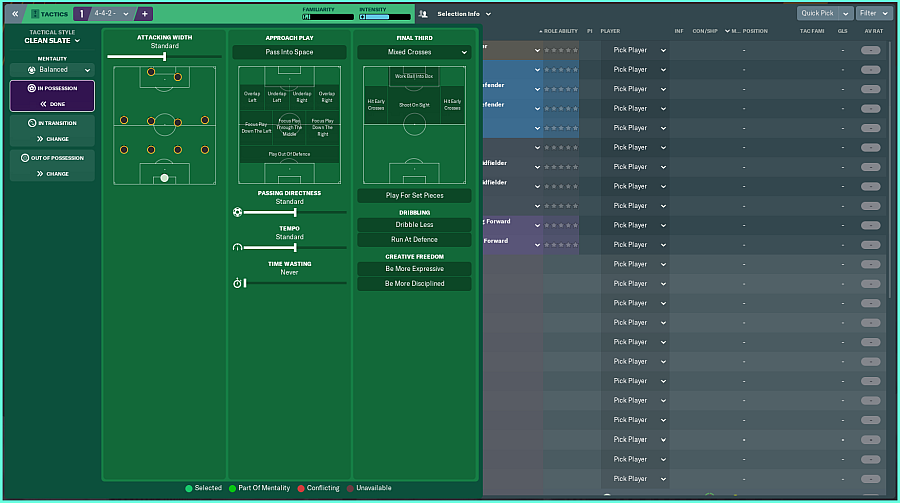
The game then breaks down your tactical instructions into three specific zones. In Possession details what you want your team to be doing with the ball. Essentially, this is how you’re instructing your team to win the game. Passing directness can go from extremely short to extremely direct, the former being an extreme form of ball retention, the latter essentially being hoofball up to the strikers. Tempo can go from very low to extremely high. This determines how quickly you want the ball to move, with slow passing lending itself to patient build-ups, and therefore possession-based football, while higher tempo serves to disorientate and daze the opposition by sheer speed of play.
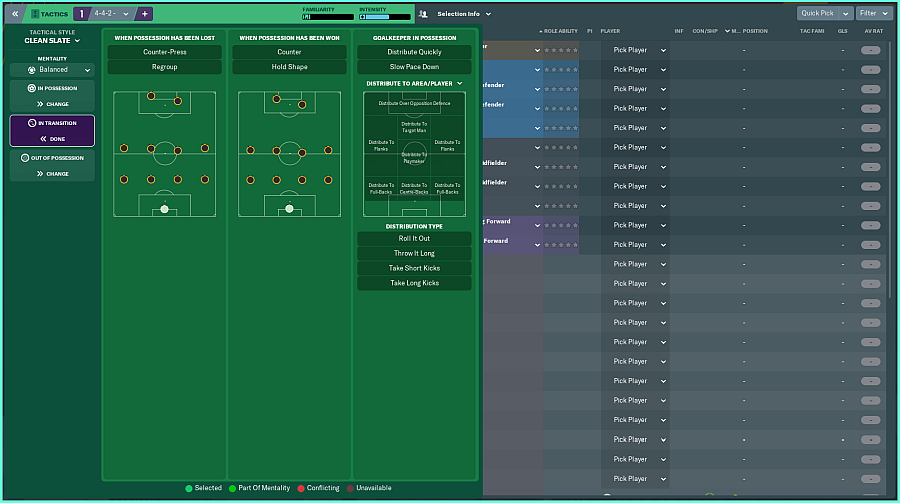
In Transition concerns what happens when the ball changes hands, so to speak. Counter-pressing means that your players will want to grab the ball back immediately, while regroup means the boys drop back to get back into possession to prevent counterattacks. Countering when possession is won indicates that you want your guys to try and catch the opposition out and score against the run of play, holding shape means going back to patient build-up once the ball is regained. The tab for goalkeeper possession principally determines what you want your keeper to do after goal kicks and after claiming the ball. Launching it long supports counterattacks, while kicking it short allows for building up from the back.
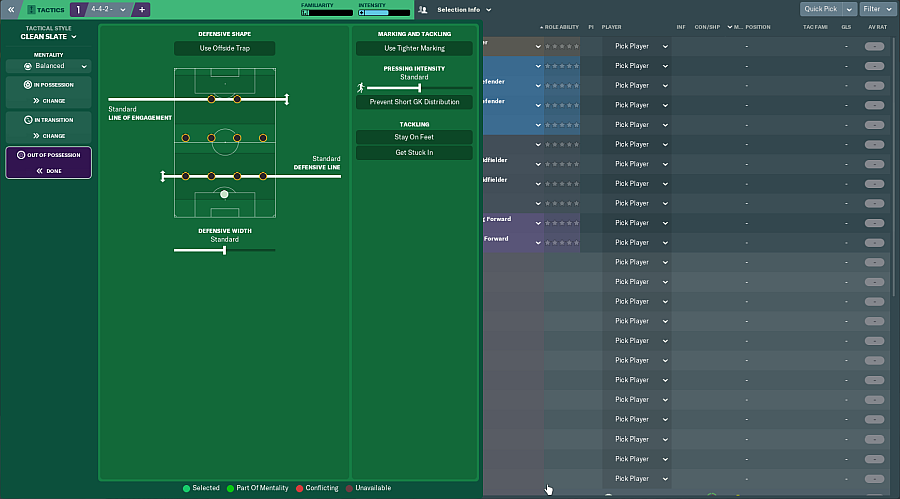
Out Of Possession determines how your team acts when possession is held by the other team. The level of engagement determines where pressing starts and where the team’s offensive line tends to sit, while defensive line determines where your defenders are placing themselves, with a high line pushing the team forward and allowing for very quick recycling of the ball for attacks, while a deep line means that the team is more resistant to counterattacks, especially if the centre backs on the slower side.
Staying on your feet and diving in are two opposite sides of the coin, with diving in meaning a higher rate of tackling and turnovers with a higher rate of yellow and red cards, while staying on your feet relies on the individual skill of the tackler and hopes for a low volume of higher quality tackles to account for relying on only safe tackling.
Playing the offside trap instructs your defensive line to try and get the opposition caught offside. This requires good pace and, more importantly, good communication so that the defensive unit is always in agreement as to when they want to push forward and when they slide back.
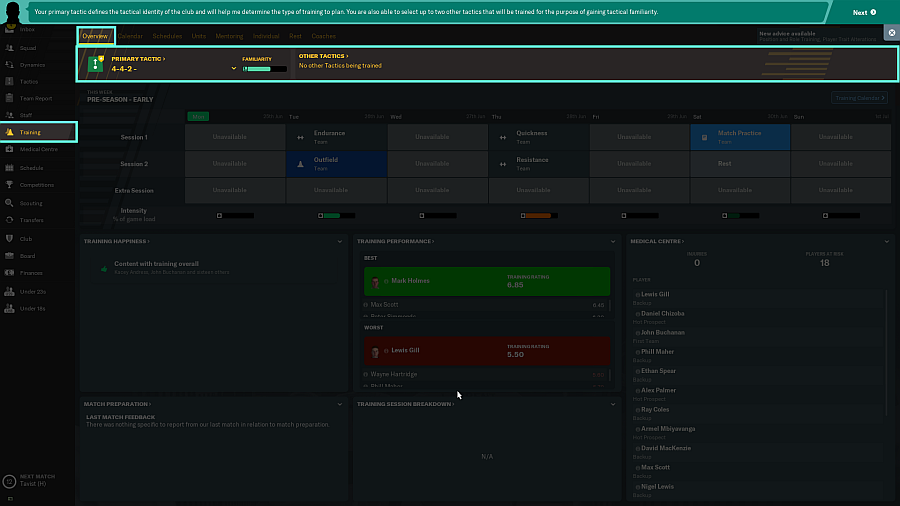
Training has been overhauled for this game, with it becoming much easier to mould your team into the football machine you want it to be. Each week, you’re given a training review and a training plan for the next week. Each training module, highlighted in dark blue in the above image, can be changed into a variety of specific training modules. If your team is facing a team that has a high proportion of headed goals, it may be worth it to train aerial defense and heading. If your team has been scuffing chances and fluffing their lines, attacking shadow play and chance conversion training can do wonders.
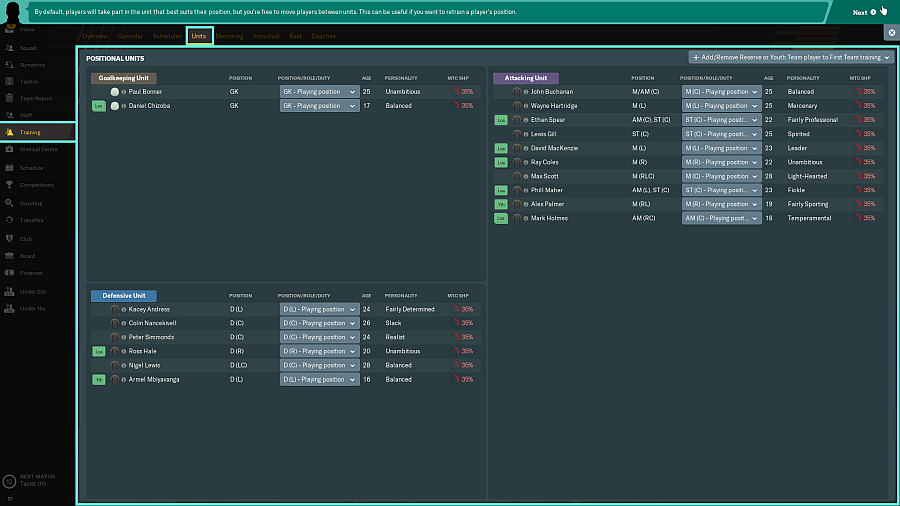
Your squad is divided into training units, pre-assigned by the game but able to be changed by the player. This can be useful when retraining a player to a different position. For example, if I want Ron the winger to become Ron the full back, I’d move him to the defensive unit. Each unit has a different focus and players might become upset if their unit is being asked to train too hard or isn’t receiving enough attention.

Mentoring has gone through a change as well. Beforehand, a manager would assign a player to tutor a single player, generally under the age of 24. In FM19, mentoring is divided into groups and each player in the group has a given influence on that group based on their social standing and seniority. Mentoring can be very useful for acquiring traits and indeed some traits can only be attained via mentoring. If I wanted Ron the winger to learn how to place his shots, then I’d place him in a group with Fred, who already knows how to do that. Mentoring also affects a player’s personality, so it’s good to have mentors who are model citizens or determined to reach their goals so that it rubs off on the players they’re mentoring.
_______________
Of course, to start training and mentoring players, we’ll need to have players. That’s where you come in. Armed with the knowledge that your player is likely to be rubbish and jump ship within a year, please give me:
Full Name:
Nickname (Optional):
City of Birth and Nationality:
Age: Between 17-38
Position: Goalkeeper (GK), Centre Back (CB), Full Back (FB), Central Midfielder (CM), Wide Midfielder (WM), Striker (ST)
You can also describe your player, giving me height, weight, hair colour, etc. The level of detail is up to you.
Example using a real player:
Full Name: Jorge Resurrección Merodio
Nickname: Koke
City of Birth and Nationality: Madrid, Spain
Age: 28
Position: CM



 : Am I right in saying this is your first foray into senior management, Mr. Berardi?
: Am I right in saying this is your first foray into senior management, Mr. Berardi?
 : That’s right. And just Gio is fine.
: That’s right. And just Gio is fine.
 : Let’s not get too familiar. We may be a semi-pro outfit, but I expect a level of professionalism here. If we are to make it to the big time, I believe that it’s important to instil these sorts of standards within the club. Now, before we start, do you have any questions?
: Let’s not get too familiar. We may be a semi-pro outfit, but I expect a level of professionalism here. If we are to make it to the big time, I believe that it’s important to instil these sorts of standards within the club. Now, before we start, do you have any questions?
 : None just yet.
: None just yet.
 : Good. Let’s continue. I’ll introduce you to the club. After Exmouth Town F.C. folded in 2008, many people in this town were understandably disappointed. To fill the void in their hearts, a group of four American expatriates founded this club, introducing it to the English footballing pyramid in the summer of 2008. The original crop of players comprised a group of construction workers, these men lending the club the nickname it keeps to this day. The Excavators, as we are called, are a club with big dreams. We intend to become a professional club within the next five years. The funds do so will not fall into our laps. Getting us to the next level is a job we’ve seen fit to entrust to you.
: Good. Let’s continue. I’ll introduce you to the club. After Exmouth Town F.C. folded in 2008, many people in this town were understandably disappointed. To fill the void in their hearts, a group of four American expatriates founded this club, introducing it to the English footballing pyramid in the summer of 2008. The original crop of players comprised a group of construction workers, these men lending the club the nickname it keeps to this day. The Excavators, as we are called, are a club with big dreams. We intend to become a professional club within the next five years. The funds do so will not fall into our laps. Getting us to the next level is a job we’ve seen fit to entrust to you.

 : You have a year to impress us. You’re free to make a case to make your stay longer. Don’t force us to make it shorter. As I'm sure you're doubtless aware, we'll be playing our games in the National League South, one half of the sixth division of English football. This is as fine a place as any to start a managerial career. If you have realistic expectations about both the budget and the quality of football, you'll enjoy your time here. For now, let's get you acquainted with the facilities…
: You have a year to impress us. You’re free to make a case to make your stay longer. Don’t force us to make it shorter. As I'm sure you're doubtless aware, we'll be playing our games in the National League South, one half of the sixth division of English football. This is as fine a place as any to start a managerial career. If you have realistic expectations about both the budget and the quality of football, you'll enjoy your time here. For now, let's get you acquainted with the facilities…








